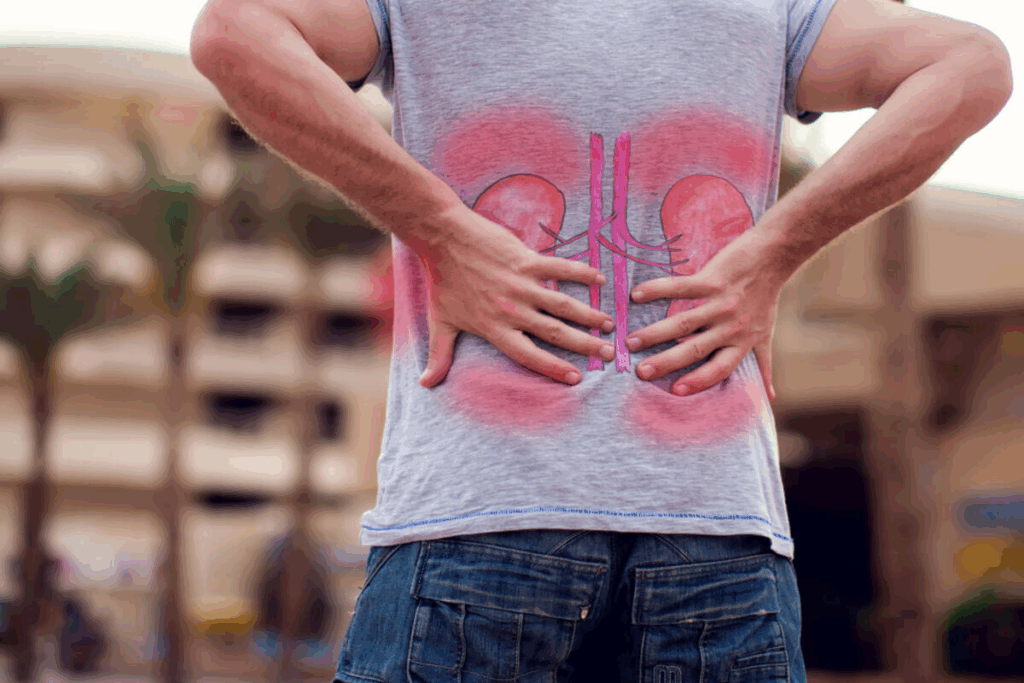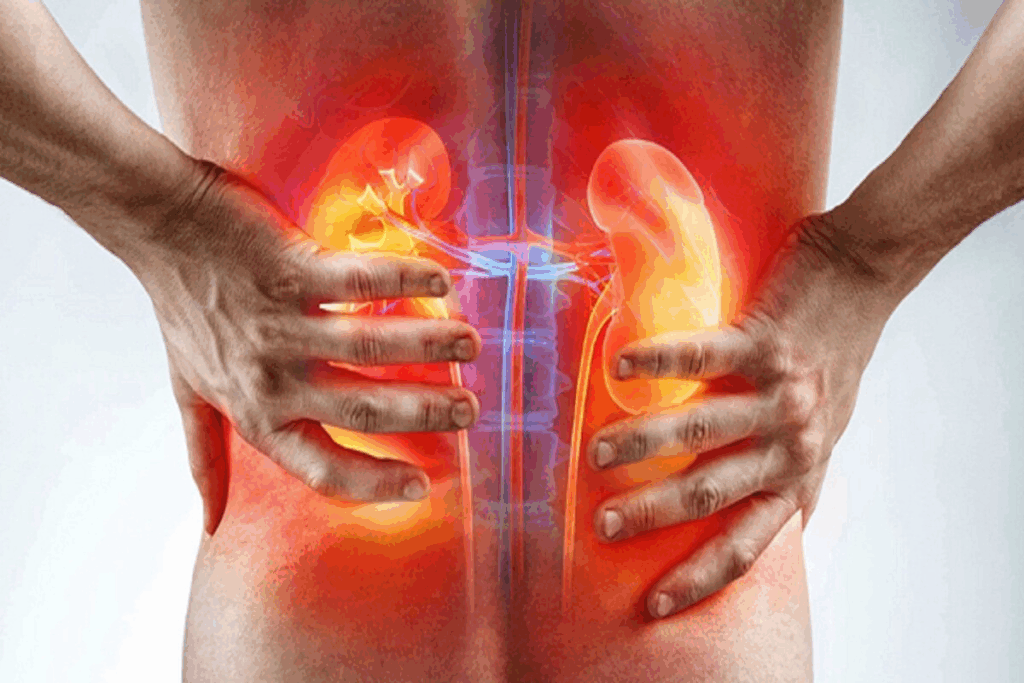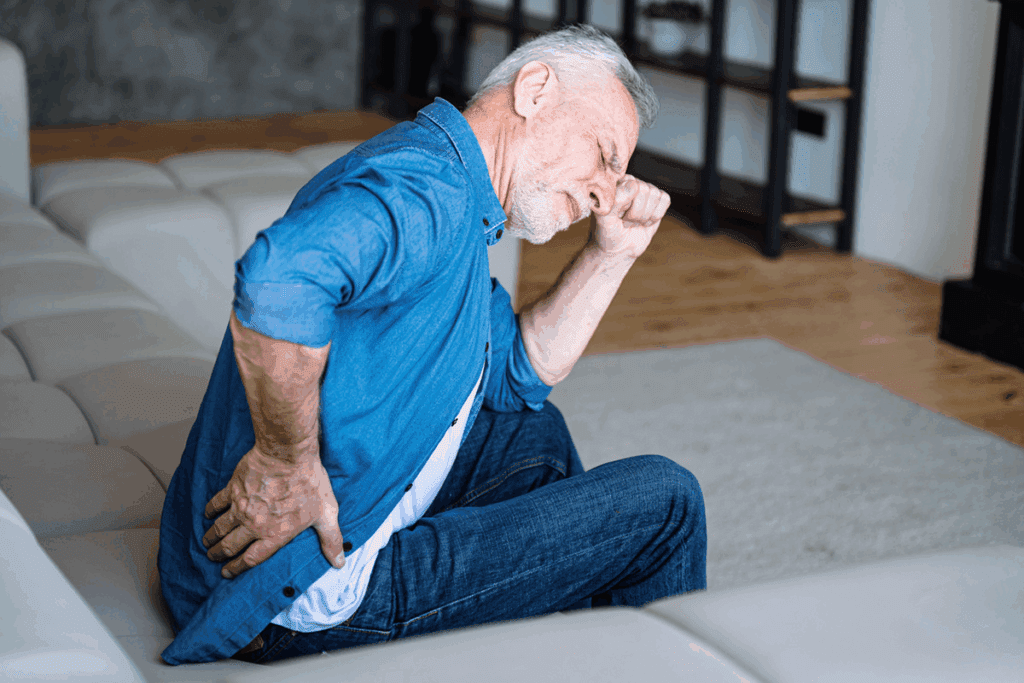
Feeling bloated, gas, or constipated and wondering if it’s related to kidney stone symptoms? Many people with kidney stones face unexpected digestive problems. These issues often go unnoticed.
Can kidney stones cause gas and bloating? Learn how the pain from kidney stones can lead to secondary gastrointestinal symptoms.
At Liv Hospital, we focus on the whole body’s health. We look at both urological and digestive problems together. Kidney stone formation can cause bloating and discomfort in the stomach.
It’s important to understand how kidney stones affect the stomach. Patients with kidney stones might feel gas or have trouble going to the bathroom.

Kidney stones are hard, crystalline masses that form in the kidneys. They vary in size and composition. These stones can cause severe pain and are a significant health concern for many individuals.
Kidney stones are solid masses of crystals that form in the urine. They happen when there’s an imbalance of water, salts, and other substances. They can be as small as a grain of sand or as large as a pea, and some stones can even be several centimeters in diameter.
The composition of kidney stones can vary. The most common types are made of calcium oxalate, calcium phosphate, uric acid, or struvite. Knowing what they’re made of is key to figuring out the cause and treatment.
There are several types of kidney stones, each with different causes and risk factors:
Kidney stones are a significant health issue in the United States. They affect approximately 11 percent of men and 6 percent of women at some point in their lives. The prevalence has been increasing over the past few decades, likely due to factors such as diet, obesity, and dehydration.
Understanding the prevalence and types of kidney stones can help in developing preventive strategies and treatments. By recognizing the risk factors and taking proactive measures, individuals can reduce their likelihood of developing kidney stones.

Knowing the symptoms of kidney stones is key for quick diagnosis and treatment. These symptoms can vary and may need a doctor’s check-up to avoid serious issues.
The main symptom of kidney stones is severe pain. It usually starts in the lower back or flank. This pain can feel sharp and stabbing, spreading to the groin or belly as the stone moves.
The pain from kidney stones can be very debilitating. It makes it hard for people to stay comfortable or move easily.
Along with pain, kidney stones can cause other symptoms. These include nausea and vomiting, often because of the pain. You might also find yourself needing to urinate more often or feeling a constant urge to do so.
In some cases, you might see blood in your urine. This could mean the stone is irritating or damaging your urinary tract lining.
If your symptoms don’t get better or get worse, you should see a doctor. Fever and chills with pain could mean an infection, which is a serious issue. Severe pain that doesn’t go away with medicine or trouble urinating are also signs you need medical help.
We suggest talking to a healthcare professional if you’re experiencing these severe symptoms. This ensures you get the right treatment quickly and avoid any serious problems.
Kidney stones are known for causing intense pain. But they can also lead to bloating and gas. The link between kidney stones and digestive issues is complex. It involves many mechanisms that can upset normal bowel function.
Kidney stones don’t directly cause gas or bloating. But the pain they cause can have indirect effects on the digestive system. For example, the pain might make people change their eating habits or bowel movements.
The sharp pain from kidney stones can mess up normal bowel movements. This can lead to constipation, causing bloating. Also, the discomfort might make people eat less or avoid certain foods. This can add to digestive problems.
Research shows kidney stones can cause gastrointestinal symptoms. Studies find that the pain and discomfort from kidney stones can affect bowel habits. This can lead to symptoms like bloating.
Inflammation and dehydration, common in kidney stone patients, also play a part. Dehydration can cause constipation. Inflammation can mess with normal digestive processes.
Many patients with kidney stones experience gastrointestinal symptoms. These include bloating, gas, and changes in bowel movements. It’s important to understand these experiences to provide better care.
By recognizing the interconnectedness of kidney stone symptoms and digestive issues, healthcare providers can offer more complete support. They can address both the pain and the digestive discomfort caused by kidney stones.
To understand digestive symptoms in kidney stone patients, we must look at pain, inflammation, and the nervous system. Kidney stones can cause more than just pain. They can also lead to digestive issues like gas and bloating.
Pain from kidney stones can be very intense. It affects how our body works. Pain can activate shared nerve pathways between the gut, brain, and urinary tract. This leads to digestive problems.
When a kidney stone blocks the way, it can cause pain. This pain can affect the nerves that control digestion. It might cause nausea, vomiting, and changes in bowel habits. This shows how our body’s systems are connected.
Inflammation is key in symptoms from kidney stones. Inflammatory responses can affect gastrointestinal function. This can cause symptoms like gas, bloating, and changes in bowel movements.
A kidney stone can cause inflammation. This inflammation can spread and affect the digestive tract. It can disrupt normal digestion, causing uncomfortable symptoms.
The nervous system controls both the urinary tract and the digestive system. The shared nerve supply between these systems means disturbances in one can affect the other.
In the case of kidney stones, pain and inflammation can affect the nerves connected to digestion. This leads to various gastrointestinal symptoms. Understanding these connections is important for managing kidney stone effects.
Kidney stones and constipation often go together. This is not just a coincidence. There are deep connections between them. We will look into how kidney stones can cause constipation.
Kidney stones can lead to constipation in several ways. Dehydration makes stools harder and harder to pass. The pain from kidney stones can also mess with bowel movements.
Pain medications, like opioids, are often used for kidney stone pain. These can slow down digestion, causing constipation.
Dehydration is common in kidney stone patients. It happens because they need to drink a lot to prevent stone formation. When they don’t drink enough, their urine gets more concentrated. This makes stools harder to pass.
To avoid dehydration, patients should drink plenty of water. Drinking water helps prevent new stones and keeps bowel movements regular.
Telling the difference between kidney stone pain and constipation pain can be hard. But, knowing the type and location of the pain helps. Kidney stone pain is sharp and severe, often in the flank or lower back.
Constipation pain is usually more spread out. It’s often felt in the lower abdomen, along with bloating. Knowing these differences is key to treating each condition right.
Medications for kidney stones can sometimes upset the stomach. These treatments aim to ease the pain, which can be very bad. But, the drugs used for pain can mess with how our gut works.
Pain meds are key in treating kidney stone pain. Drugs like NSAIDs and opioids are often used. They help with pain but can also upset the stomach.
NSAIDs can irritate the stomach and raise the risk of bleeding. Opioids, on the other hand, can slow down how food moves through the gut. This can cause constipation and other problems.
Opioids can cause constipation as a side effect. They slow down the gut, making it hard to go to the bathroom. This is a big problem for people with kidney stones.
To deal with this, doctors might use laxatives or stool softeners. They also recommend drinking more water, eating right, and staying active.
It’s important to manage side effects from kidney stone meds. For constipation caused by opioids, doctors might prescribe special drugs. These include lubiprostone or naloxegol.
Changing your diet and staying active can also help. It’s key for doctors to talk about these side effects with their patients. This way, patients can make smart choices about their treatment.
Watching for side effects and adjusting treatment plans is important. It helps keep the meds from messing with digestion too much.
Knowing what foods can help prevent kidney stones and improve digestion is key. A balanced diet is vital for both. It helps prevent kidney stones and keeps your digestive system healthy.
Drinking enough water is important for preventing kidney stones and good digestion. It makes urine less concentrated, lowering stone risk. It also helps prevent constipation and some gut problems.
It’s recommended to drink at least eight glasses of water a day. More water can help those at risk of kidney stones or with digestive problems.
Changing your diet can help with both kidney stones and digestion. Eating less sodium is good for both. Too much sodium can lead to more kidney stones and worsen digestion.
Also, eating fewer foods high in oxalate is wise for some kidney stone types. Spinach, beets, and rhubarb are examples. A diet rich in fruits, veggies, and whole grains is healthier overall.
Some foods can raise the risk of kidney stones or hurt digestion. Avoiding or eating less of these can help.
Food Category | Foods to Avoid | Foods to Include |
Protein Sources | Excessive red meat | Lean proteins like poultry and fish |
Vegetables | High oxalate vegetables like spinach and beets | Low oxalate vegetables like cucumbers and bell peppers |
Dairy | High-fat dairy products | Low-fat dairy products or calcium supplements |
Making smart food choices can lower your risk of kidney stones and boost your digestion.
Kidney stone sufferers often face extra discomfort from gas, bloating, and constipation. It’s key to manage these symptoms well. This involves using home remedies, making lifestyle changes, and sometimes getting medical help.
There are many ways to ease gas, bloating, and constipation. Drinking more water is a must. It helps prevent constipation and can help stones pass. Drinking water and other fluids like prune juice can also help with digestion.
Dietary changes are also important. Eating foods high in fiber like fruits, veggies, and whole grains can help with constipation. Avoiding foods that make gas and bloating worse, like beans and cabbage, is also helpful.
If home remedies and lifestyle changes don’t work, medical help might be needed. Over-the-counter meds like laxatives or anti-gas meds can help. Sometimes, doctors prescribe stronger meds for severe symptoms.
Symptom | Possible Medical Intervention |
Constipation | Laxatives, Stool softeners |
Gas and Bloating | Simethicone, Activated charcoal |
Severe Pain | Prescription pain medication |
To prevent future kidney stones, making dietary changes and staying hydrated is key. Eating less sodium and animal protein can help. Some meds can also prevent certain types of stones.
By following these tips, you can better manage symptoms during kidney stone episodes. You can also lower your risk of getting stones again in the future.
It’s important to understand how kidney stones affect our digestion. We’ve seen how they can lead to gas and bloating. Managing these symptoms is key to good digestive health.
By tackling the indirect effects of kidney stones on digestion, patients can feel better. This approach not only relieves pain but also boosts overall health.
The link between kidney stones and digestive problems is complex. It involves pain, inflammation, and how our nervous system works. Healthcare providers can help by addressing these issues.
Knowing how kidney stones impact our digestion helps patients and doctors work together. This teamwork improves life quality for those dealing with these issues.
Yes, kidney stones can indirectly cause gas and bloating. This is because the pain and discomfort they cause can disrupt digestion.
Kidney stones can lead to constipation in several ways. Dehydration, pain, and certain pain medications like opioids play a role.
The main symptoms of kidney stones include severe pain in the side or back. This pain can also spread to the lower abdomen or groin. Other urinary symptoms are also common.
Yes, dehydration is a big risk for constipation in those with kidney stones. It makes the colon pull water, leading to hard, dry stool.
To manage these symptoms, try home remedies and lifestyle changes. Stay hydrated, modify your diet, and consider certain medications.
Yes, making dietary changes can help. Stay hydrated, reduce sodium, and eat more fruits and vegetables. These can prevent kidney stones and ease digestive issues.
Yes, some treatments for kidney stones can cause stomach problems. Opioids, for example, can lead to constipation, nausea, and vomiting.
Kidney stone pain is usually severe and in the side or back. Constipation pain is crampy and in the lower abdomen. But, it’s best to see a doctor for a proper diagnosis.
Kidney stones themselves don’t usually cause long-term digestive issues. But, repeated episodes or underlying conditions might lead to ongoing problems.
To prevent kidney stones and ease digestive symptoms, stay hydrated and modify your diet. Manage stress and avoid foods that can trigger stones and discomfort.
Sivarajan, G., & Masterson, T. A. (2014). Ten-year Outcomes of Sexual Function After Radical Prostatectomy. European Urology, 66(2), 222-230. https://www.sciencedirect.com/science/article/abs/pii/S0302283813008476
Subscribe to our e-newsletter to stay informed about the latest innovations in the world of health and exclusive offers!
WhatsApp us